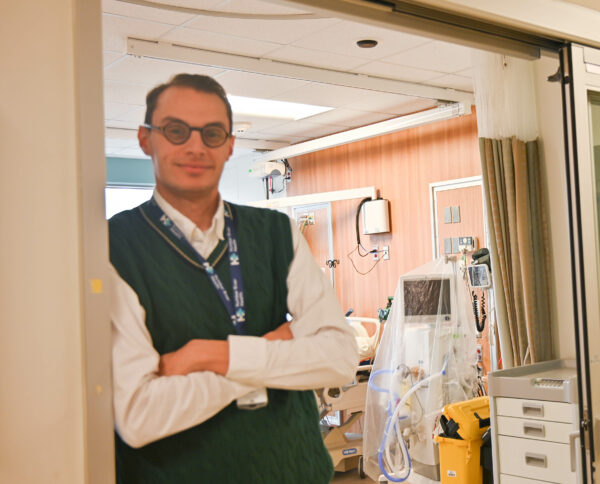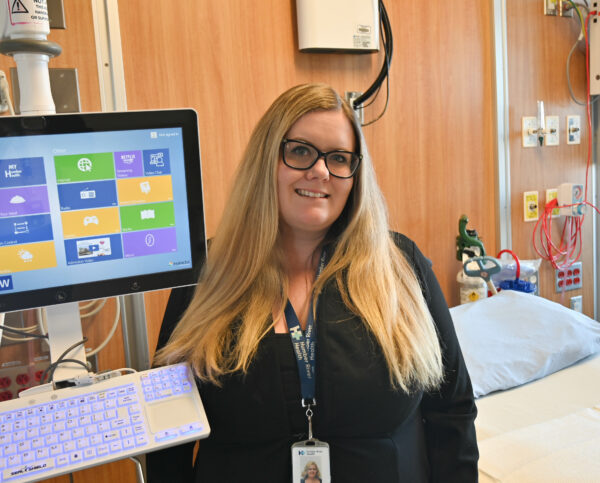Celebrating Social Work
05
Mar
2024
Social Workers play a pivotal role in helping patients and families address and navigate the impact(s) of illness and treatment. Social Workers help individuals, families, and communities with enhancing their individual and collective well-being, while navigating complex social systems and advocating for effective solutions.
Mena Kamel and Kristy McGarva, Social Workers at Humber River Health, have provided insight and shared their thoughts on what this year’s Social Work theme means to them.
What are your day-to-day responsibilities?
Mena: As a Social Worker, I am entrusted with approaching patients and their families in a holistic manner during their most vulnerable times. Through assessments, we provide a comprehensive understanding of a patient’s unique needs, strengths, and coping mechanisms. This understanding forms the basis for collaboratively developing nuanced care plans alongside the interdisciplinary healthcare team. Furthermore, it provides us a framework of a patient’s beliefs and values near end-of-life care with the utmost sensitivity, honouring the dignity and autonomy of each individual.

Kristy: As a Social Worker, my job is very versatile; we have a hand in much of what is going on at any given time in the Intensive Care Unit (ICU). This can be a traumatic environment for patients and families and we are there to provide emotional support, grief counselling, and general help to those who need it most. The ICU team often relies on us to unravel complicated family dynamics. When patients are intubated, unconscious, and otherwise unable to speak for themselves, we must quickly establish the appropriate contact person and the patient’s legal decision maker.
We also play a large role in patient planning and patient flow, such as helping patients transfer to different units or referring patients to an outside program. The Social Work team helps patients and families navigate the next steps, whatever that looks like for them.

What does this year’s theme, “Social Work Opens Doors”, mean to you?
Mena: This year’s theme captures the profound impact our profession has on the lives of those we serve. Each interaction presents an opportunity to dismantle barriers and usher in new possibilities for positive transformation. Through our unwavering commitment to advocacy, empowerment, and social justice, we pave the way for marginalized voices to be heard and for systemic injustices to be addressed. Indeed, the doors we open are not merely physical; they are gateways to hope, healing, and resilience.
Kristy: For me, this year’s theme is about reducing barriers and making the world more accessible for everyone. Oftentimes, we encounter individuals and families who are not aware of the governmental and community resources available to them. We help them find and connect them to the information they need in a more accessible manner. We work to address systemic barriers in everything we do, from navigating complex forms and application processes to educating others. We dedicate ourselves to advocating for our patients through connecting them to services they are entitled to, and ultimately helping them succeed in a way that empowers them.
What advice would you give to someone interested in a career in Social Work?
Mena: If you are considering a career in Social Work, I would refer to the roots of the profession:
- Embrace a genuine sense of empathy and compassion towards others, as these qualities form the bedrock of effective social work practice.
- Prioritize self-care and seek support when needed, as the work can be emotionally taxing.
- Stay open to continuous learning and growth, and don’t hesitate to reach out for mentorship or guidance from seasoned professionals.
- Approach your work with humility and a sincere commitment to advocating for those in need, and you will find fulfillment in the meaningful impact you make on individuals and communities.
Kristy: Expect the unexpected! The biggest mistake you can make as a Social Worker is to have a rigid day plan. When working with people, crisis and urgency will always occur and that is okay. Be prepared to be adaptable and to enjoy the ride.
Self-care is also extremely important. I place an enormous amount of value on getting a good night’s sleep, spending time with my family, and carving out time for my hobbies. These things allow me to come to work refreshed and able to be present with my patients and my team. You have to fill up your own cup or you simply will not have enough to pour into others.
